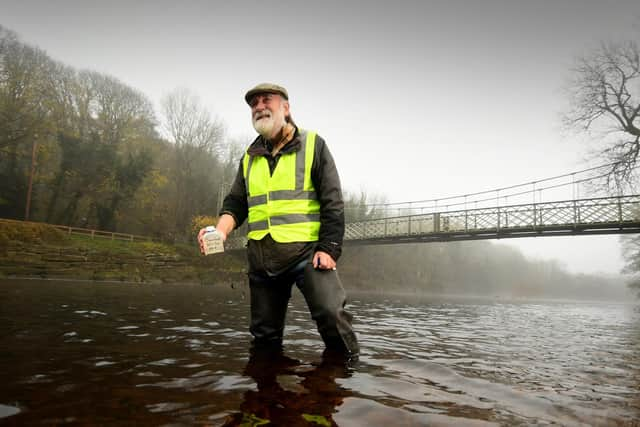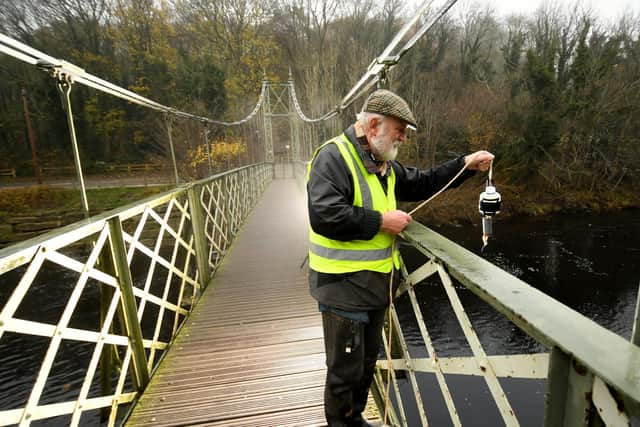Meet the group campaigning to clean up the River Wharfe in Yorkshire
Recently, the Friends of the Dales, previously Yorkshire Dales Society, hosted a capacity conference at The Devonshire Institute in Grassington that saw the Wharfe in the spotlight under the title From Peat to Paddling.
Professor Rick Battarbee of University College London, vice president of the Friends of The Dales and a founder of the Ilkley Clean River Group was one of a number of speakers.
Advertisement
Hide AdAdvertisement
Hide AdIn an exclusive interview this week Rick was candid about what he felt had been the chances of the Wharfe receiving bathing water status at Ilkley.


“I thought it was a ridiculous suggestion. I thought the river was never going to achieve that status because it was not clean enough. I didn’t think we would be successful because we knew what the quality was already because we’d been measuring it.
“However, it turns out that bathing water status qualification depends not on the water quality itself but on the popularity of the river for recreation.
“The Ilkley Clean River group, led by Becky Malby and Karen Shackleton, had to demonstrate that people went down to Cromwheel Beach in Ilkley and use it on a regular basis, which they do and in some cases in very high numbers. Volunteers counted people on the beach, in the water whether young people, old people, canoeing, swimming or paddling, which was all required by Defra. They put that lot together with popular opinion and support alongside the work we were doing. It was submitted and was successful.
Advertisement
Hide AdAdvertisement
Hide Ad“Cromwheel can get up to a couple of thousand on a warm bank holiday and that’s how the River Wharfe became the first running water to achieve the status, in 2020. There were already other inland water bathing sites, but all lakes. Windermere has four such points. Another running water has recently achieved the same on the Thames.


Rick’s presentation featured the whole length of the river, but highlighted pollutants at Addingham and Ilkley. He pointed out that he isn’t against people bathing in the river but said the risks were far greater where there were heavier concentrations of such as faecal bacteria.
“A lot of people thought ‘My Gosh!’ it’s got bathing water status this must be a great place to go and swim, but the condition of the river hasn’t changed one bit in the last five to ten years or so and there are points where if you’re going to swim you don’t want to be taking any water on board at all.
“Downstream of Ilkley the pollutants are almost certainly 100 per cent coming from the sewage works, but upstream the pollutants come from a combination of sources, from sewage, from agriculture, from becks that flow into the Wharfe. The amount that comes from each depends on run-off and rainfall.
Advertisement
Hide AdAdvertisement
Hide AdRick said that livestock plays its part in river contamination upstream of Ilkley, but that he’s more concerned with the pumping station in Addingham.
“In wet weather the pumping station overflows and causes a high concentration of faecal bacteria and that’s more the cause of problems than agriculture.
“Fencing off of the becks is important though, as bacteria gets into the water from cows’ faecal deposits.
“If a cow and cows can get down to a beck, urinate and excrete this causes problems. In dry weather it is not much of a problem but if you get, as we get frequently, a rainstorm after a period of dry weather the becks come up quickly and wash down the edges of the banks transferring soil, bacteria and nutrients into the water.
Advertisement
Hide AdAdvertisement
Hide Ad“I could take you to hundreds of points where there’s livestock accessing becks and where in wet weather these problems are exacerbated.
Rick said that his concerns about the health status of the River Wharfe was certainly not all down to livestock, and there was much work to be done by every sector responsible for contamination and addressing the river’s pollutants.
“I’m very cautious about pointing fingers because I live in the community, even though I know where the clean and dirty farms are. What should come out of the new Environmental Land Management Scheme (ELMS) is that farmers should be compensated or subsidised to fence off becks. This will certainly help in the long term if implemented.
“There are miles and miles of protection required and that’s one way of controlling some of the pollution, but you also have to look at the sewage treatment works from the villages such as Grassington upstream and the care of the other water courses.
Advertisement
Hide AdAdvertisement
Hide Ad“There is talk of how far contamination will travel downstream. It’s a contentious issue. We’ve been sampling all the way along the river right from Langstrothdale and the thing about bacteria is that while they do get into the river they also naturally die off.
“If you’ve got sewage treatment works in Grassington and that is discharging treated and untreated sewage and putting in a high concentration of faecal bacteria the first thing is how much river flow is there, and how much dilution is taking place? This can vary massively depending upon whether the river is high or in drought conditions. It is also going to depend on the rate of die-off. So, will bacteria that enters from Grassington have died off completely before reaching Ilkley.
“When you go downstream from Ilkley you see Ilkley in context. It is the most important point source of pollution on the whole river. Ben Rhydding, Burley/Menston, Otley Wetherby and Tadcaster are all polluting to some extent, but not quite as strongly as Ilkley. Is it a clean river? Yes and no.